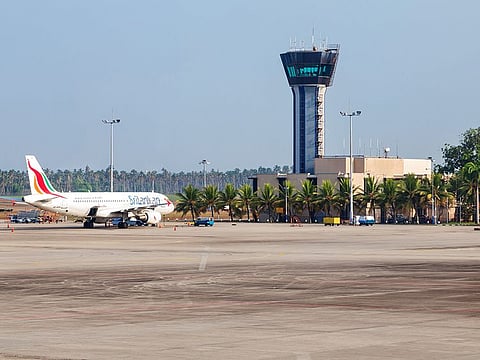Sri Lankan expats in UAE delay plans to fly home this summer as more airlines cancel flights
More airlines go in for flight cancellations, reduces services to crisis-hit Sri Lanka

Dubai: Airlines in the UAE and elsewhere have started cancelling their services to Sri Lanka amidst the political and economic situation in the country. On Monday (July 11), flydubai became the latest to do so, after protestors took over the residence of Sri Lanka’s President. India’s Vistara Airways had put all its Sri Lanka flights on hold a few months ago.
Etihad Airways said that starting July 14 the airline’s return flights from Colombo will make a short stop to refuel at Cochin. “Passenger services between Abu Dhabi and Colombo are currently operating as normal – Etihad continues to closely monitor the situation in Sri Lanka,” said an airline spokesperson.
This will severely dent Sri Lanka’s tourism hopes, with holiday travellers likely to opt for other Indian Ocean destinations. Also dropping would be the number of expat Sri Lankans in the UAE and Gulf flying back for summer vacations. Many have postponed any immediate plans to fly to the home country as more uncertainty is added over airlines' plans.
Jet fuel purchases in Sri Lanka have come to a halt, and this means airlines have to make stops in India to re-fuel. This could also lead to longer flight times. Industry sources said that airlines will have to continue fueling this way until there’s a solution to Sri Lank’s current unrest.
“With the Sri Lankan rupee getting slammed against the dollar, operating costs of airlines in the country are 50 per cent higher,” said Mark Martin, founder of Martin Consulting. “Eventually, airlines will have to pass on these costs to the consumer.”
With only SriLankan Airlines and Emirates offering direct flights from Dubai to Colombo, fares have gone up quite a bit. A one-way ticket to Colombo costs Dh1,000-Dh1,500, with some Emirates flights going for more than Dh4,000.
Demand takes a dive
Travel agents in Dubai say that while enquiries for tickets to Sri Lanka have dried up, there’s quite a bit of incoming traffic. “We had removed Sri Lanka from our list of recommended destinations,” said a spokesperson for South Travels DMCC.
The Dubai-based travel agency sees around 10-15 monthly bookings from Sri Lankans looking to visit the UAE. “We are only accepting people who already have relatives here because we are concerned about them overstaying,” said the spokesperson.
Operating on schedule
SriLankan Airlines, which did not immediately respond to a Gulf News query on its flight frequencies, had previously denied rumors that it was cancelling a host of flights due to the fuel shortage. SriLankan ‘vehemently’ denies the accuracy of such information and confirmed it has been able to manage schedules with suitable adjustments for over a week.
“Flight schedule changes that have been necessary to manage the prevailing circumstances include changes to the timing and duration of certain flights with the introduction of stops in select foreign airports for fuel tankering purposes,” said a statement by the national carrier. “However, SriLankan Airlines continues to operate its flight schedule close to 100 per cent of efficiency despite any impediments and the operational implications of schedule revisions.”
It remains to be seen what the recent developments mean any potential privatization plans, first announced by Prime Minister Ranil Wickremesinghe in May. A SriLankan official had told Gulf News that the airline was operating at over 70 per cent of its pre-pandemic capacity due to a surge in ‘Sixth Freedom’ traffic.
A lost year for Sri Lanka's tourism?
For Sri Lanka to become viable as a destination again, tourists need to flock back. But tourism will remain affected as long as there is limited clarity on what sort of solutions there are to resolve the crisis. Fuel remains in acute shortage. “The airline business is extremely susceptible to external risks, and if the government as much as sneezes, airlines are the first to catch a cold,” said Mark Martin at Martin Consulting.
Sign up for the Daily Briefing
Get the latest news and updates straight to your inbox






![The 32-year-old faces multiple charges after opening an emergency exit. [Illustrative image]](http://media.assettype.com/gulfnews%2F2025-10-12%2Fwv70u969%2Fnewsml_afp_com_20251012T124306Z_doc_78hc99g.jpeg?w=320&auto=format%2Ccompress&fit=max)
